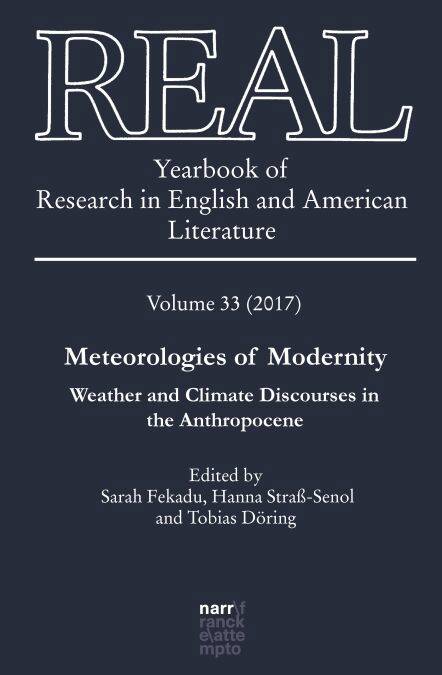
Bedankt voor het vertrouwen het afgelopen jaar! Om jou te bedanken bieden we GRATIS verzending (in België) aan op alles gedurende de hele maand januari.
- Afhalen na 1 uur in een winkel met voorraad
- In januari gratis thuislevering in België
- Ruim aanbod met 7 miljoen producten
Bedankt voor het vertrouwen het afgelopen jaar! Om jou te bedanken bieden we GRATIS verzending (in België) aan op alles gedurende de hele maand januari.
- Afhalen na 1 uur in een winkel met voorraad
- In januari gratis thuislevering in België
- Ruim aanbod met 7 miljoen producten
Zoeken
REAL - Yearbook of Research in English and American Literature E-BOOK
Vol. 33 (2017): Meteorologies of Modernity. Weather and Climate Discourses in the Anthropocene
€ 113,60
+ 113 punten
Omschrijving
Meteorologies of Modernity explores the ways in which literature reflects and participates in discourses on weather and climate – historically as well as at our contemporary moment. Literature contains a huge meteorological archive built throughout the centuries. The essays collected in this volume therefore ask to what extent literature can bring the vastness and complexity of climate change into view, how literature offers ways to think through the challenges of the Anthropocene both culturally, historically, and aesthetically, and, last but not least, how it helps us to conceptualize a radically new understanding of what it means to be human. The thirteen contributions from literary and cultural studies address weather and climate discourses from a variety of conceptual angles and cover a broad range of historical and geographical contexts. Topics include representations of tropical climates in Shakespeare, the close yet tense relationship between literature and the rising discipline of meteorology in the nineteenth century, allegories of climate change in postcolonial literature, and climate catastrophes in the contemporary clifi novel. By employing a historicizing and comparative approach, the volume addresses the need for studying representations of climate and climate change in an interdisciplinary, transnational and transhistorical framework, overcoming traditional disciplinary boundaries and creating new collectives of theory and criticism that are essential when debating the Anthropocene.
Specificaties
Betrokkenen
- Uitgeverij:
Inhoud
- Aantal bladzijden:
- 289
- Taal:
- Engels
- Reeks:
Eigenschappen
- Productcode (EAN):
- 9783823391579
- Verschijningsdatum:
- 11/06/2017
- Uitvoering:
- E-book
- Beveiligd met:
- Digital watermarking
- Formaat:

Alleen bij Standaard Boekhandel
+ 113 punten op je klantenkaart van Standaard Boekhandel
Beoordelingen
We publiceren alleen reviews die voldoen aan de voorwaarden voor reviews. Bekijk onze voorwaarden voor reviews.








